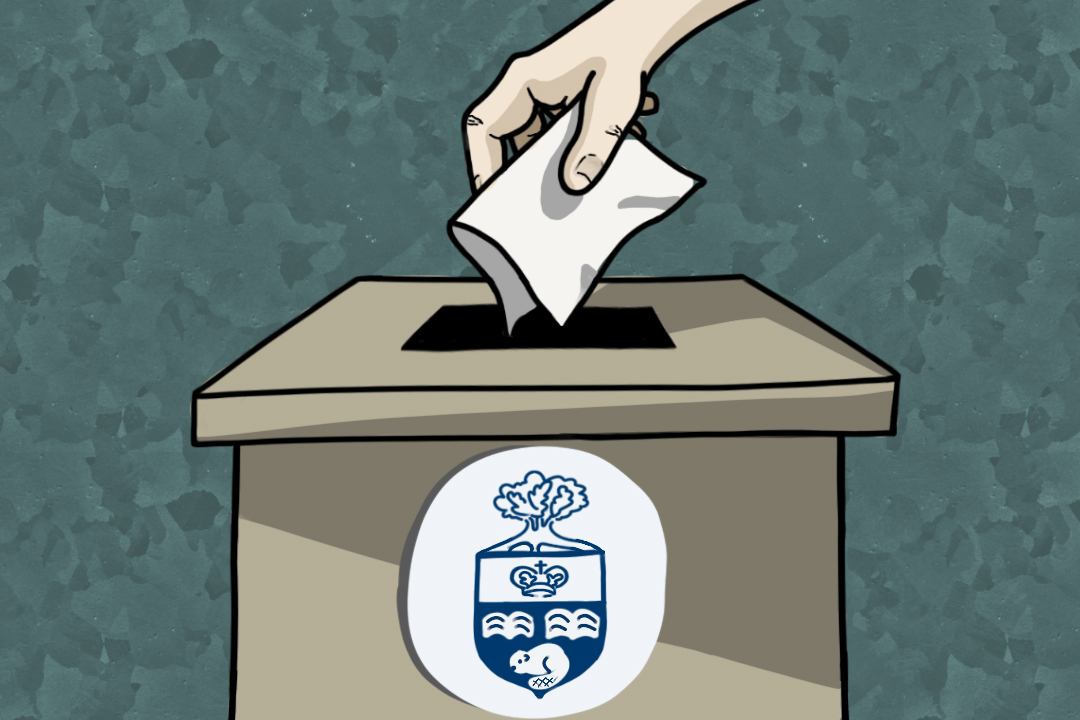One central point of democracy is to make sure that the views and goals of people in power reflect the views and goals of the people affected by that power. So, when you cast your vote in an election for the University of Toronto Students’ Union (UTSU), the Governing Council, or your faculty union, you’re meant to choose someone who shares your stances on important issues.
As I see it, campus politics aren’t currently issue-based. And while most student politicians are smart, substantive, highly qualified people, I don’t think these qualities are what wins them elections.
For example, look at the UTSU candidates’ debates. Candidates repeat lines like “engage with students,” “make voices heard,” and “stay committed to accessibility/equity/awareness” every year. Students may wholeheartedly agree with these messages, but close attention reveals that the lines themselves don’t actually mean anything. These phrases usually appear without any elaboration. They don’t describe a specific action or a goal that can be measured in any meaningful way.
Lack of crucial candidate information
Student candidates also post other shallow materials on social media. If you type ‘vote’ in your Instagram search bar, you’ll probably find that a few candidates’ campaign accounts already follow you. These accounts rarely present anything policy-related.
Disappointingly for lovers of flare, they don’t tend to have catchy slogans either. No sizzle, and no steak. The campaign pages are mostly instructions on how to vote, surrounded by template graphics. Sometimes, there’s a photo of the candidate standing in a quad, smiling. Physical signs and posters I see are just as vapid.
Often, candidates will exhibit their relevant past experiences, but these aren’t always so helpful. To use fictional examples; it’s very impressive to learn that someone is the first-year representative for the vape-tricks society or five-time recipient of the Richard Nixon award for public policy, but this doesn’t say much about how prepared that candidate is for organizing frosh week or managing a multi-million dollar budget.
It is important to note that many candidates present very thoughtful, detailed, and creative materials. However, it is also important to note that these types of candidates don’t seem to win any more often than the others.
One private message, one vote
One student politician, Soban Atique, a fourth-year student majoring in criminology and political science, wrote to The Varsity that during his run for a seat on the Governing Council, “the goal is to reach out to the greatest number of people in the most efficient way possible.” For him, that meant “private messaging as many people as [he] could.” Soban described this process as “tedious,” but he won 292 votes — more than any of the other 50 undergraduate students who ran that year.
Student politician Samir Mechel wrote similar things to The Varsity via email. Mechel also indicated that the most effective strategy seems to be directly contacting as many voters as possible. This approach can work with strangers — but it also helps to actually know hundreds of people. Knowing more people seems to be the most practical advantage to having experience at lower levels of student government, like executive positions of small clubs or secondary positions in smaller unions; these positions introduce you to a lot of people.
It wouldn’t be right to simply call student elections a popularity contest because no one necessarily has to like you to vote for you. They just have to feel bound by politeness enough to say yes.
If you’re not daunted by the idea of asking for a little favour from a hundred acquaintances a day right in the middle of midterm season, then running for a campus election is the perfect hobby for you. If you’re the person who avoids any grocery stores that don’t offer self-checkout, you might have to give a second thought to any campus political ambitions.
So why is the election system like this? Student government matters. The UTSU handles tens of millions of dollars every year. The Arts & Science Students’ Union is responsible for bringing fall reading week to students under the Faculty of Arts and Science. The students we elect to the Governing Council have a role in setting our tuition fees.
Shallow elections may be a sign of function
Students are busy. They have bills to pay and lectures to attend. There are real-world politics to be upset about. I understand how difficult it is to expect students to pay attention to the little league variant — campus politics — on top of everything.
For anyone not paying close attention, it may be difficult to understand the inner machinations of all the unions and councils, to determine what policies are best, or know what experiences make someone the most qualified. So when a candidate belts out their whole resume and 15-point plan, many students can’t help but hear it simply as noise.
But this isn’t the worst thing in the world. In a way, the shallowness of campus elections is a sign of function because engagement usually only tends to surge whenever there’s a scandal.
The highest voter turnout in any UTSU election over the past decade was in 2018, after the UTSU had sued its former president for the theft of nearly $278,000, and then made the controversial decision to settle the case out of court. In recent elections, major UTSU positions have been contested by just one candidate or none at all. However, in 2016, two full slates of candidates with highly developed platforms and inspiring messages of change fiercely competed for every position as, earlier that year, a UTSU vice-president had been impeached after being publicly accused of sexual assault.
Still, it would be too gloomy to think that a higher standard of politics is impossible without this kind of extreme prompting. All we really need is for students to pay a little more attention.
Devin Botar is a second-year student at St. Michael’s College studying history and classics.



No comments to display.